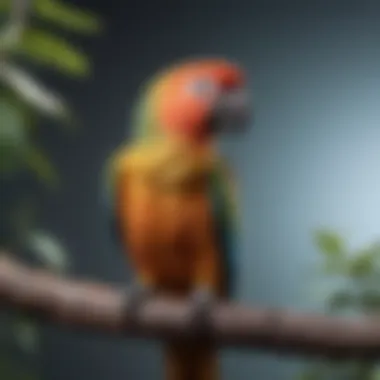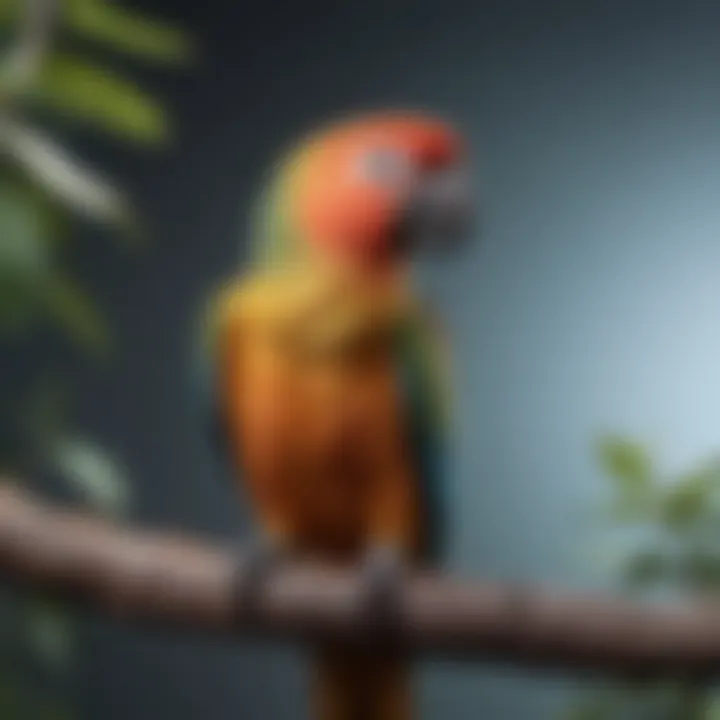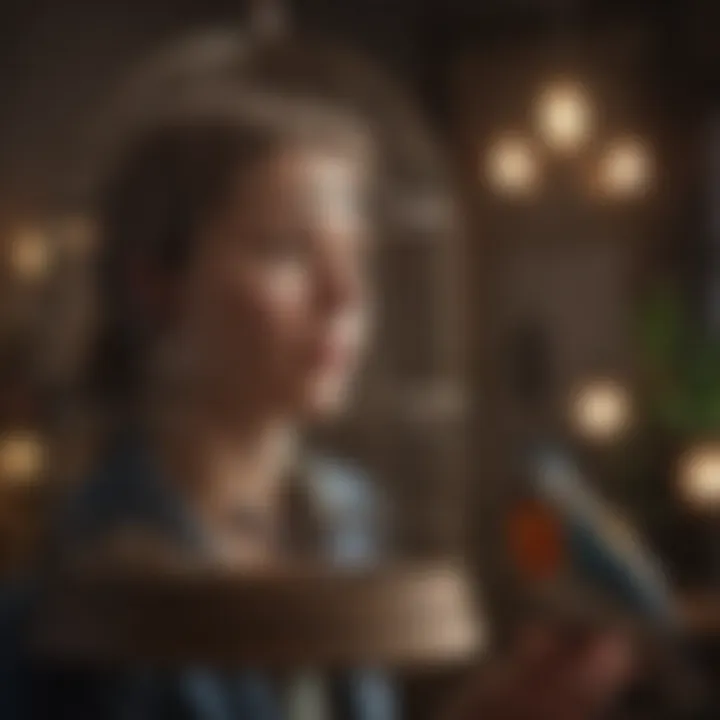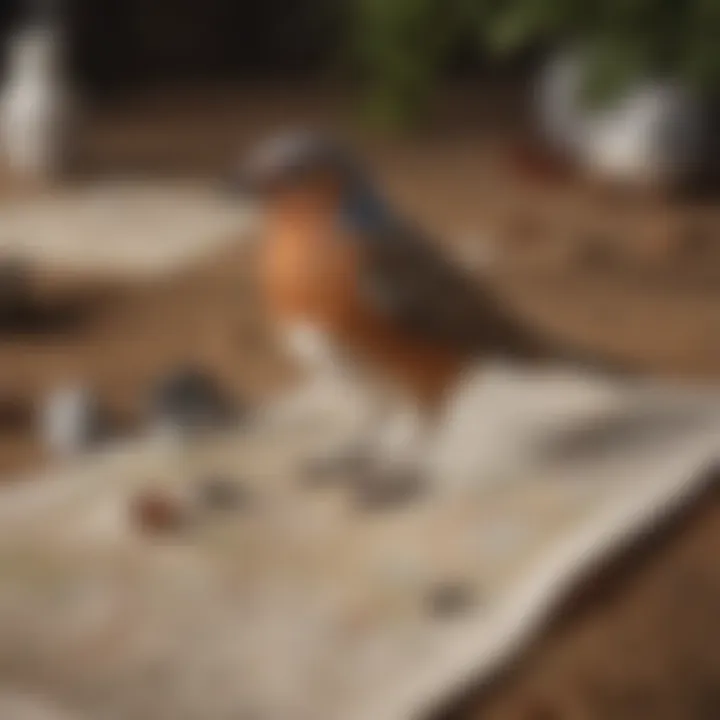Understanding Pet Bird Return: Factors and Insights


Intro
Birds have found their way into our homes and hearts like few pets can. The bond between pet owners and their feathered companions can be strong, intricate, and filled with joy. However, the reality remains that some pet birds are returned to shelters or rescues, raising questions about the dynamics of pet ownership. Understanding the reasons behind these returns is crucial for anyone considering rescuing or adopting a bird. This article aims to dissect these key factors, providing bird owners and potential adopters with valuable insights about enhancing the bird ownership experience.
Avian Care Basics
Importance of Proper Nutrition
To begin with, a bird’s health depends significantly on its diet. Birds come in different shapes and sizes, each with unique dietary needs. For example, budgies thrive on a mix of seeds, pellets, and fresh fruits and vegetables, while larger birds such as macaws have a more complex nutritional requirement that includes nuts and specially formulated diets.
Including nutrition-focused discussions in your pet ownership toolkit can contribute to a well-adjusted and healthy bird, minimizing the likelihood of returns due to health-related issues.
Understanding Bird Species and Their Needs
Not all birds enjoy the same lifestyle. Some species prefer companionship, while others may be independent. Researching bird species can unveil a wealth of information, such as socialization preferences and play styles. For instance, cockatiels often thrive on social interactions with their human counterparts whereas finches are more content with their flock. Understanding these traits can help potential owners make informed decisions that align with their lifestyle and expectations.
Basics of Birds Habitat Setup
Creating an ideal living environment is vital. Birds need ample space for flying, play, and rest. A well-set-up cage with stimulating toys and perches can go a long way. The choice of cage should accommodate not just the bird’s size but also its natural behaviors. For example, a parrot's cage should allow space for climbing and swinging, whereas a canary’s needs may be minimal, focusing more on vertical space. Proper habitat setup can significantly reduce stress and promote happiness, key factors in preventing returns.
Grooming and Hygiene Tips
Grooming is another aspect that can’t be overlooked. Regular baths, nail clipping, and monitoring feather health are essential elements of pet bird care. Getting familiar with your bird's specific grooming needs will help keep them healthy and minimize the chance of returns due to neglect. Remember, a bird that feels clean and comfortable is a bird that is less likely to experience stress.
Interacting with Your Pet Bird
Building Trust and Connection
Establishing a bond with your bird requires patience and understanding. Birds can be shy and require a gentle approach. For example, offering your pet treats, talking softly, and spending quality time together can encourage trust. Each interaction helps build a foundation for a lasting relationship.
Training Techniques and Tips
Training isn’t just about teaching tricks; it’s about communication. Simple techniques like clicker training can aid in teaching birds commands and cues. Regular practice, combined with positive reinforcement, can lead to a well-behaved companion. Birds accustomed to training are often better adjusted, less prone to behavioral issues, and consequently less likely to be returned.
Fun Activities for Bird Owners and Their Birds
Engaging in activities is essential for both the bird's mental stimulation and the owner’s enjoyment. Interactive toys, foraging activities, and even simple games can create both fun and bonding experiences. Whether it’s creating obstacle courses or teaching new words, keeping your bird active can improve its overall well-being.
Recognizing Bird Cues and Behaviors
Understanding bird behavior is like learning a new language. Birds communicate through body language and vocalizations. Knowing when your bird is excited, scared, or comfortable can inform your decisions and interactions. By learning these cues, owners can respond to their birds' emotional needs effectively, thus reducing the chance of issues that lead to returns.
Emotional Well-Being of Birds
The Role of Play and Socialization
Birds are social creatures, often needing interaction to feel fulfilled. Playtime is critical; it not only entertains but also helps to strengthen the bond between owners and birds. Birds deprived of social interaction can develop harmful behaviors. Providing an enriching environment with playdates can ensure happiness and longevity, vastly improving pet ownership experience.
Enhancing Birds' Emotional Health
A bird’s emotional state is tied closely to its environment and interaction. Regularly rotating toys and introducing new activities can help keep any pet bird mentally engaged. A tired bird is a happy bird, and finding ways for them to explore new experiences is a cornerstone of sound emotional health.
Assessing Bird Stress and Remedies
Stress can manifest in various ways, from plucking feathers to excessive squawking. Being able to identify signs of stress is vital. Ensuring a tranquil living space, free from loud noises and sudden changes, is key. If stress becomes apparent, consulting with an avian veterinarian can provide options to create a more peaceful home.
Building Strong Human-Bird Bonds
Finally, building rapport with your bird is not just an emotional endeavor but also a fulfilling journey. Investing energy into your bird’s life improves both the owner’s experience as well as that of the bird. A strong bond can be the difference between a happy pet and one that feels isolated.
Bird Health and Safety
Common Health Issues and Prevention
Like any pet, birds have their own set of health challenges. Common ailments include feather problems, respiratory issues, and nutritional deficits. Regular health checks and being aware of symptoms can help catch problems early on. Preventative care ensures that your bird receives the best chance of a long, healthy life, minimizing the reasons for potential return.
Routine Veterinary Care
Just because birds are small doesn’t mean they don’t need proper veterinary care. Schedule regular check-ups with an avian vet who understands the ins and outs of bird health. These visits are crucial for maintaining wellness and can help spot issues before they become serious, ensuring a healthier bird overall.
Environmental Hazards to Avoid
Birds are susceptible to environmental toxins. It's important to safeguard your bird’s habitat from hazards like exposure to non-stick cookware fumes or certain houseplants that can be toxic. Knowledge of safe and unsafe items can drastically reduce health risks, providing peace of mind for bird owners.
Signs of Illness or Distress


Being vigilant about changes in your bird's behavior is essential. Signs like lethargy, changes in eating habits, and unusual vocalizations are signals that something may be wrong. Owners being proactive about these signs can lead to quicker interventions, promoting healthier, happier birds.
Fun Facts and Quirky Insights
Unique Traits of Popular Bird Species
Every bird species carries its own set of characteristics. Parrots, with their mimicry abilities, can create a lively atmosphere. Finches, in their smallness, are often charmingly vocal in their own ways.
Historical and Cultural Significance of Birds
Birds have fascinated humans for centuries. From mythologies to art, they symbolize everything from freedom to companionship, showcasing their profound influence across cultures. Understanding these connections can deepen the appreciation of our feathered friends.
Famous Bird Owners and Their Stories
Many notable figures, from poets to political leaders, have kept pet birds that have transcended mere companionship into a symbol of personal expression. Recognizing their relationships with these pets can inspire modern bird owners to nurture their own special bond.
Prolusion to Pet Bird Return
The world of pet birds is as varied as the feathers that line their bodies. Understanding why some birds return to their owners, or conversely, why they do not, is key to improving the overall experience for avian enthusiasts. Pet bird return encompasses various elements that extend far beyond mere ownership; it's intricately woven into the emotional, behavioral, and environmental tapestries of both the bird and its keeper.
Defining Pet Bird Return
"Pet bird return" refers to the phenomenon where birds, under certain circumstances, might be brought back to their previous owners or shelters. This can stem from different factors such as behavioral issues, health problems, or environmental mismatches.
When a new pet owner finds themselves unable to maintain their bird’s needs — be it from a lack of time or understanding — they might feel compelled to return it. However, this shouldn't just reflect on the species as a whole but rather speaks volumes about the owner's commitment and preparation. The term highlights an important aspect of pet ownership that many overlook, which involves realizing that bringing a pet into one’s home is a long-term commitment. It’s not merely about having a companion; it requires understanding, patience, and effort.
Significance of Understanding Return Rates
It's equally important to grasp why tracking pet bird return rates is essential for current and prospective bird owners alike. By taking a closer look at return trends, we can glean valuable insights into the overall health of avian companionship. Understanding these rates has several significant implications:
- Improving Owner Education: By analyzing return data, we can identify common educational gaps. For instance, many new bird owners might not realize how crucial socialization is for a parrot.
- Enhancing Welfare Practices: High return rates can highlight systemic issues within pet stores or breeding practices, prompting a need for better protocols regarding animal welfare.
- Supporting Responsible Ownership: When owners understand the reasons behind their decisions, they can better prepare for a bird's unique needs. As a practice, reaching out to communities—maybe even joining a subreddit for bird lovers—could provide seasoned insights that can make ownership smoother.
"Understanding the nuances of why birds return can transform how we care for and relate to our feathered friends."
The Emotional Connection Between Birds and Owners
The bond between pet birds and their owners is a rich tapestry woven from affection, companionship, and shared experiences. Understanding this emotional connection is crucial when discussing pet bird return rates. Birds, while often perceived as simple creatures, exhibit complex behaviors and emotions that can develop into deep relationships with their human caretakers. Recognizing the significance of this bond enhances the commitment of bird owners and, ultimately, the welfare of the birds themselves.
Bonding Through Interaction
Interactions between birds and their owners can be numerous and varied. Birds often mimic sounds, engage in playful antics, and demonstrate affection in ways that create lasting memories. Activities like training sessions, where the bird learns new tricks, can significantly strengthen this bond. These interactions serve not just to foster attachment but also provide mental stimulation for the bird, influencing its overall behavior and well-being.
Consider how a parrot, for instance, learns to greet its owner with a cheerful chirp every time they enter the room. This small act, seemingly trivial, signifies recognition and strengthens their connection. Giving the bird time out of its cage for play and exploration—within a safe environment—is invaluable; it allows the bird to display its personality, further solidifying the emotional ties. Furthermore, these moments lead to better understanding between the two, fostering an atmosphere of trust.
Impact of Owner Experiences
The experiences of bird owners play an instrumental role in shaping their relationship with their feathered companions. Every encounter can either bolster the bond or create potential rifts. Owners who actively share their lives with their birds—whether through play, gentle handling, or speaking—promote a sense of security in the avian world. Such interactions allow birds to express themselves and feel like a valued member of the family.
However, not all experiences are rosy; stressors such as moving homes, changes in routine, or introduction of new pets can unsettle both birds and their owners. For instance, an owner who adopts a budgerigar might initially feel a rush of joy, but if the pet is consistently left alone for extended periods, feelings of loneliness could arise, impacting both parties. Birds are sensitive to their environments and the moods of their owners, which is why fostering a calm, engaging atmosphere is beneficial. Indeed, the essence of these shared experiences can influence a bird's behavior, making them easier to train and less likely to exhibit distress behavior.
"It’s not simply a pet; it's a little feathered friend that knows you in ways others cannot."
Ultimately, nurturing the emotional connection between birds and their owners can lead to enhanced care and successful bird-keeping, reducing the likelihood of returns. Recognizing that these relationships go beyond mere ownership invites a more profound level of responsibility. By understanding the impact of interaction and experience, potential issues can be avoided, ensuring a lovingly maintained bond that flourishes over time.
Behavioral Factors Influencing Bird Returns
When it comes to understanding why pet birds might be returned or rehomed, behavioral factors play an irreplaceable role. Just like any companion animal, birds have unique personalities and instinctual behaviors that can influence their relationship with their owners. Recognizing these behavioral traits is crucial for both current and prospective bird owners, as it can help to foster a smoother, more satisfying relationship with their feathered friends. It's not just about providing food and shelter; it involves recognizing the complex interplay between behavior and human interaction.
Understanding Avian Behavior
Birds are particularly sensitive creatures, each species exhibiting its own behavioral norms. It's paramount for pet owners to grasp these behavioral patterns to develop a harmonious relationship. For instance, take the case of a parakeet named Kiwi. When adopted from a busy pet store, Kiwi was initially skittish, avoiding human contact. Over time, with gentle handling and consistent interaction, he began to thrive and show a sociable side.
Understanding avian behavior requires observing postures, vocalizations, and the interactions birds have among themselves. Some signs, like fluffing feathers, can indicate comfort, while others, such as biting or hiding, may signal distress. Owners that neglect these behaviors often face misunderstandings with their birds, which can lead to frustrated birds and, in severe cases, returns.
Signs of Distress in Pet Birds
Identifying signs of distress is akin to deciphering a complex language. Unlike dogs or cats, birds may not always vocalize their feelings loudly, which can obscure their discomfort or fear. \n Here are some common signs to monitor:
- Feather Plucking: This can range from mild adjustments to severe self-mutilation, indicating anxiety or health issues.
- Changes in Appetite: A sudden lack of interest in food can signal distress; conversely, excessive eating can point toward stress, too.
- Over-vocalization: If a bird that usually chirps softly begins to squawk incessantly, it might be expressing discomfort or unease.
Every bird has its own set of signs, so spending time observing them is essential. Paying attention to these hints is critical in preventing situations that lead to returning the bird.
Common Misunderstandings About Bird Behavior
Many misconceptions abound when it comes to avian behavior, primarily stemming from a lack of knowledge. One common misunderstanding is that all birds should act like pets, such as parrots, which are much more social than, say, canaries. A canary may not appreciate being held or cuddled, yet that doesn't mean it isn't happy.


Another myth is that birds require constant interaction. While social species benefit from interaction, other species thrive in quieter settings. Misjudging a bird’s social needs can create stress or anxiety, which subsequently leads to returns if owners feel that the encounter is too challenging.
A pivotal point for owners is to educate themselves on their bird’s specific characteristics and needs. Ignorance isn’t bliss when it comes to pet ownership. By learning what behaviors are typical for their specific bird type, owners can prevent misunderstandings and ensure a thriving relationship.
"When you know your bird, you can better anticipate their needs, leading to a more fulfilling and successful pet ownership experience."
Health Considerations and Their Implications
When it comes to owning a pet bird, understanding health considerations is of utmost importance. Birds can’t voice their discomfort or pain like other pets, so as an owner, you need to be proactive in recognizing health issues that can lead to returns. Physical well-being and mental health are intricately linked in birds, affecting not just their behavior but also their ability to bond with their owners and thrive in captivity.
Maintaining the health of pet birds is crucial for both their quality of life and the overall happiness of their human companions. A well-cared-for bird will exhibit stable behavioral patterns, which directly impacts the owner's experience. Proper health management can prevent many possible returns after the initial adoption, allowing for a deeper and lasting relationship.
Physical Health Issues
Physical health in pet birds often remains hidden under feathers, and many owners are unaware of potential issues until it’s too late. Birds such as parrots, finches, and canaries can suffer from a range of physical ailments, including but not limited to nutritional deficiencies, obesity, and infectious diseases.
Here are some common physical health problems that can affect birds:
- Nutritional Deficiencies: Poor diet can lead to serious conditions like metabolic bone disease. A bird's dietary needs vary by species, so it’s essential to provide a balanced diet enriched with seeds, fruits, and vegetables.
- Obesity: Overfeeding and lack of exercise lead to obesity, which can cause heart problems and respiratory issues. A well-balanced diet, combined with healthy out-of-cage time, is crucial.
- Infectious Diseases: Birds tend to hide their sickness until it's severe. Regular vet check-ups are the best way to catch ailments like Psittacosis or Avian Influenza in the early stages.
It is vital for bird owners to stay vigilant and conduct frequent health checks to catch any signs of distress early.
A thorough understanding of these physical issues can prevent many returns and make the bird ownership experience much smoother.
Mental Wellness of Pet Birds
Mental health plays just as significant a role as physical health in a bird's overall well-being. Birds are intelligent creatures, capable of forming bonds with their owners and experiencing a range of emotions. Stressed or bored birds may show signs of self-destructive behavior, feather plucking, or aggression.
Factors affecting mental wellness include:
- Social Interaction: Birds are social animals. Without adequate interaction—be it with another bird or their human companions—they can become lonely and depressed. Owners need to engage with their birds regularly.
- Enrichment Activities: Providing toys, puzzles, and opportunities for flight not only keeps birds entertained but also mentally stimulated. A bored bird is often an unhappy bird.
- Environmental Stability: Constant changes to their environment, loud noises, or disruptions can create stress. Keeping a stable, familiar environment helps in managing mental wellness.
Understanding and addressing mental health adequately can not only improve the quality of life for the bird but also enhance the bond with the owner, making the thought of returning the bird less likely.
Overall, prioritizing both the physical and mental health of pet birds is essential. With the right knowledge and resources, bird owners can nurture their feathered friends into happy and healthy companions.
Environmental Influences on Bird Behavior
Understanding how environmental factors shape avian behavior is key for pet bird owners. The environment doesn’t just frame the physical setup of a bird's home; it greatly affects their mood, health, and ultimately their bond with their human companions. A well-designed habitat can significantly enhance a bird’s well-being, making the nuances of bird behavior linked tightly to their environment.
Importance of Habitat Setup
Creating an optimal habitat for pet birds involves more than just providing a cage; it’s about crafting a sanctuary that mirrors their natural habitat as closely as possible. This setup should account for the bird’s species, size, and engagement needs. Here are some essential elements to consider when cultivating a suitable habitat:
- Space: Birds, especially larger species like parrots, require ample space to move around. A cramped environment can lead to feelings of confinement, increasing stress levels that might trigger negative behaviors.
- Perches and Swinging Objects: Varied perches at different heights and widths help provide enrichment and encourage exercise. Including swings or ladders might also inspire playful behaviors that keep a bird active and entertained.
- Natural Elements: Incorporating things like branches, plants, and safe-for-birds materials can recreate a more natural feel. Not only do these elements help fulfill their instinctual behaviors, but they can also serve as sources of intrigue and comfort.
- Hiding Places: Birds often need a safe spot to feel secure. Providing places for them to retreat, such as small huts or covered areas within the cage, fosters a feeling of safety.
"A rich environment can help mitigate stressors and foster better health outcomes for pet birds."
Maintaining a stimulating environment is beneficial for long-term happiness. Pet owners must regularly rotate toys and perching spots, keeping the space fresh and inviting.
The Role of Noise and Activity Levels
The intensity of noise and activity levels can significantly influence a bird's behavior. Birds are naturally sensitive to their surroundings and can react in varied ways to sound. Here’s a detailed look into how these factors play into their psychological state:
- Background Noise: Continuous loud noises can cause stress in birds, making them anxious or fearful. For instance, shouting or nagging television drama can unsettle an otherwise calm bird. It’s crucial to maintain a balanced sound level in their vicinity.
- Interactions with Humans and Other Pets: The level of interaction also matters. Birds thrive on social activity but need it to be calm. If they are always in the thick of household chaos, their anxiety might spike. Conversely, providing moments of quiet time can be just as vital for their mental health.
- Daily Routines: Setting a daily routine can be calming for birds. Consistency in feeding times, playtime, and quiet times can help reduce anxiety. Birds, like humans, enjoy predictability in their lives.
- Assessing Reactions: Look out for signs indicating how your bird reacts to surrounding noise. If they frequently fluff up their feathers or make alarm calls, it might signal overstimulation or distress. On the other hand, if they chirp back or become more active, they might be responding positively to the sounds around them.
Educational Aspects for Bird Owners
Understanding the nuances of pet bird ownership goes well beyond merely providing food and shelter. Educational Aspects for Bird Owners embodies a crucial foundation in ensuring the well-being of these delightful companions. By investing in knowledge, caregivers can forge a stronger bond with their birds, ultimately reducing the likelihood of returns due to misunderstandings or unmet needs.
"Knowledge is power, especially when it comes to nurturing another living being."
Birds, being intelligent creatures, require mental stimulation and physical engagement. Without adequate understanding of their needs and behaviors, owners might find themselves in challenging situations where they feel lost or overwhelmed. Here are several key elements to consider:
Comprehensive Bird Care Guides
When it comes to caring for pet birds, the role of comprehensive guides cannot be overstated. These resources cover everything from diet and nutrition to habitat enrichment and socialization. A well-thought-out guide can serve as a roadmap for new and seasoned bird owners alike, enhancing the quality of care provided.
- Nutritional Basics: Birds have specific dietary requirements that can vary widely between species. For instance, while parrots may thrive on a diet rich in fruits and nuts, finches may need a base of seeds supplemented with fresh greens. A comprehensive care guide should detail optimal food choices and feeding schedules tailored to individual bird types.
- Environmental Setup: The importance of a proper habitat setup is another core element of bird care. A guide should outline the essentials of cage size, placement, and types of accessories needed—like perches, toys, and nesting areas—to foster a stimulating environment that reduces anxiety.
- Behavioral Understanding: Understanding avian behavior helps in spotting potential issues. A good guide will delve into common bird behaviors, like feather plucking or excessive vocalization, which can indicate stress or unhappiness. Recognizing these signs early can be the key to preventing behavioral problems from escalating.
Training Techniques and Their Importance
Training is another integral component of bird ownership. Contrary to the perception that birds are untrainable, many species can learn commands and tricks, leading to improved communication between bird and owner. Here’s why training is essential:


- Positive Reinforcement: Training isn't a one-size-fits-all approach. Using positive reinforcement becomes crucial. This method builds trust and encourages birds to learn acceptable behaviors. Treats or praise can turn a training session into a rewarding experience.
- Bonding Experience: Engaging in training fosters a unique bond between the bird and the owner. As birds learn new commands or tricks, they often develop a deeper level of trust and attachment to their caregivers, which can significantly enhance the overall relationship.
- Stimulation and Exercise: Regular training sessions provide mental exercise for birds. Without stimulation, birds can become bored or anxious, leading to health issues or destructive behaviors. Incorporating different training techniques can keep birds engaged and fulfilled.
Therefore, prioritizing education not only empowers pet owners, but it also directly enhances the lives of their feathered friends. The right information, mixed with compassion and patience, coaxes the potential in each bird, ensuring a more harmonious partnership and perhaps lowering return rates, along with enhancing the overall bird ownership experience.
Legal Responsibilities of Bird Ownership
As any new bird owner should know, taking in a feathered friend isn’t just a walk in the park. Especially considering that birds have their own set of rights and regulations that can affect how we care for them. Pet birds, like any domestic animals, obligate their owners to be aware of their legal responsibilities. This awareness is crucial not only for ensuring the safety of the bird but also for fostering a harmonious relationship within the community. Forgetting or disregarding these legal aspects can lead to not just problems for the bird, but also potential consequences for the owner.
First things first, it comes down to understanding what regulations exist in your locality. Different regions have varying laws regarding pet ownership, particularly for exotic birds. Some rules could involve registration, permits, or even specific care standards for certain breeds. Missing this step can lead to hefty fines or the heart-wrenching situation of having to surrender your pet.
Beyond just being aware of the laws, it’s crucial to stay informed about updates or changes. Laws can evolve based on wildlife conservation efforts or shifts in public policy, and staying in the loop can prevent unpleasant surprises. Moreover, knowing the regulations can enhance your credibility as an owner among peers and local organizations.
Understanding Local Laws and Regulations
First, it’s essential to know that laws regarding pet ownership can range from state to state, and even city to city. Regulations can determine:
- Permitted Species: Certain cities might ban keeping specific birds, especially those that are considered endangered or invasive species.
- Cage Size Requirements: Some regions put forth guidelines to ensure that birds have ample space to thrive.
- Registration and Permits: Depending on the kind of bird, a special permit might be needed. Failing to register could lead your local government to take action.
You can usually find this information on municipal websites or through local animal control offices. One popular way to keep up is by engaging with bird forums such as reddit.com. Here, fellow bird owners can share their experiences regarding local laws, helping each other navigate the complexities of bird ownership.
Ethical Considerations in Bird Care
Caring for a pet bird transcends the basics of food and shelter; ethical considerations play a significant role. Firstly, you have to ensure that the bird’s needs align with your lifestyle. Many organizations stress that bringing a bird into your home should come with the commitment to provide emotional and physical support – just like any other pet.
Here are a few core ethical principles that should guide bird care:
- Welfare: This means ensuring that your bird gets enough social interaction, mental stimulation, and a suitable living environment. Neglecting these facets can lead to behavioral issues.
- Breeding Practices: If you’re considering breeding, understanding ethical breeding practices is key. Overbreeding and irresponsibly selling pets can aggravate the issues of displacement and returns.
- Conservation: Consider adopting birds from shelters or rescues instead of buying from pet stores. Each bird rescued not only enriches your life but also makes space for other displaced birds.
Engaging in discussions and reading literature from established resources can refine your understanding of these ethical considerations. Books, articles, or even community discussions can offer insights into best practices. The ethical treatment of animals is a journey that every bird owner should prioritize, leading to deeper bonds between owners and their beloved pets.
"The greatness of a nation and its moral progress can be judged by the way its animals are treated." – Mahatma Gandhi
Resources for Enhancing Pet Bird Experience
Understanding the various resources available for bird owners plays a crucial role in shaping the pet bird experience. The realm of pet birds is not just about providing food and shelter; it's also about creating an enriching environment that fosters a deeper connection between the birds and their owners. Access to appropriate resources can significantly impact the well-being of these feathered companions and arm owners with the necessary tools to nurture that bond.
Online Communities and Forums
Engaging with online communities and forums dedicated to pet bird ownership offers several advantages. These platforms provide a space for bird enthusiasts to share experiences, knowledge, and practical advice. Here are a few key benefits of participating in these communities:
- Shared Experiences: Owners can share their stories, both triumphs and challenges, bringing a sense of camaraderie and understanding among members.
- Diverse Perspectives: Different owners have varied backgrounds and methods of bird care. Exposure to diverse viewpoints can spark new ideas on tackling common issues.
- Resource Pooling: Members often share recommendations for bird-friendly products, cage setups, and training techniques that have worked for them. This can save time and money for new owners who might feel overwhelmed by the choices out there.
- Emotional Support: Bird ownership can come with its unique emotional highs and lows. Communities often function as support systems where members provide encouragement and empathy to one another.
This collective knowledge can empower owners to make informed decisions, ultimately resulting in happier, healthier birds. Some popular platforms for bird owners include Reddit and Facebook, where many dedicated groups focus on specific species or general birdkeeping.
Professional Guidance and Consultations
Investing in professional guidance can prove pivotal in enhancing the pet bird experience. From veterinary advice to behavioral consultations, professional insight helps owners address challenges effectively. Here are aspects to consider:
- Veterinary Care: A vet who specializes in avian health is invaluable. They can provide vaccinations, diagnosis of diseases, and nutritional guidance tailored to specific bird species.
- Behavioral Insights: Sometimes, an owner might struggle with understanding their bird’s behavior. Behavioral specialists can offer insights into why a bird acts a certain way and recommend effective training methods.
- Workshops and Training: Attending workshops about bird care and training can equip owners with skills to improve their handling of birds. Learning about stress reduction techniques can be particularly beneficial.
Professional insights not only ensure the health and welfare of pet birds but also refine the relationship between owners and their companions.
Utilizing these resources can bridge the gap between merely owning a bird and fostering a lasting, fulfilling relationship. By tapping into online communities and seeking professional guidance, bird owners can enhance their experience and build a supportive environment for both themselves and their feathered friends.
The End: Synthesizing Insights for Bird Owners
Understanding the return of pet birds is more than just statistical analysis; it's about recognizing the intricate emotional, behavioral, and environmental tapestry that shapes the experiences of both the birds and their owners. The insights gleaned throughout this article underscore the vital importance of establishing a deep connection with our feathered friends while being acutely aware of their needs and the intricacies of their behavior.
When bird owners comprehend the reasons behind potential returns, they position themselves to create an environment that fosters harmony. This entails not only understanding their avian companions on a deeper level but also making informed decisions regarding their care. By synthesizing knowledge from emotional aspects to health concerns, responsible owners can significantly reduce the chances of a bird returning—whether to a shelter or simply being relinquished to others.
Additionally, awareness of environmental influences and the commitment to ongoing education can enrich both the owner's experience and the bird's well-being.
"A well-cared-for bird is often a bird that thrives, making the bond between owner and pet stronger than ever."
This intersection of commitment and knowledge brings to light
- The significance of establishing routines that cater to the individual needs of each bird.
- Recognizing signs of distress, which can prevent behavioral problems escalation.
- The need for continuous learning about bird care, along with community engagement,
- The importance of connecting with local and online resources to further education.
As we look back at the insights offered, it becomes clear that understanding pet bird return involves a multi-dimensional approach. A profound bond combined with informed care practices positions bird owners for a fulfilling relationship with their pets.
Summarizing Key Takeaways
In penning down the crux of our investigation, here are the principal takeaways for prospective and current bird owners:
- Emotional Bonds Matter: Establishing a strong emotional connection is fundamental. Birds respond positively to attentive and loving care.
- Behavior Awareness: Recognizing and understanding bird behavior can make all the difference. Failing to do so often leads to misinterpretations that can drive a wedge between the bird and the owner.
- Health is Key: Both physical and mental health impacts can influence return rates. Regular vet check-ups and understanding mental well-being are crucial.
- Environmental Comfort: The setup of a bird’s habitat greatly influences their happiness and comfort. A well-structured environment fosters a sense of security and reduces stress.
- Continuous Education: Ongoing learning about bird care, behavior, and community involvement enhances the overall experience for both bird and owner.
Future Perspectives on Pet Bird Care
Looking ahead, the landscape of bird care is steadily evolving. With an increasing focus on education and community support, several trends may influence future practices:
- Emergence of Technology: The use of technology for monitoring bird health and behavior is likely to gain traction. Innovations such as smart cages or apps can enhance how we understand our birds' needs.
- Holistic Approaches: More bird owners are leaning towards holistic care methods. This could mean incorporating natural food sources, environmental enrichment, and even mindfulness practices to promote a more fulfilling living condition for birds.
- Community Engagement: As awareness grows, bird owners will likely connect more with local and global communities. Sharing experiences and knowledge can lead to better practices and support systems.
- Legislation Changes: Future laws and regulations may shift to better protect the welfare of birds in ownership settings, further addressing the importance of ethical considerations.















